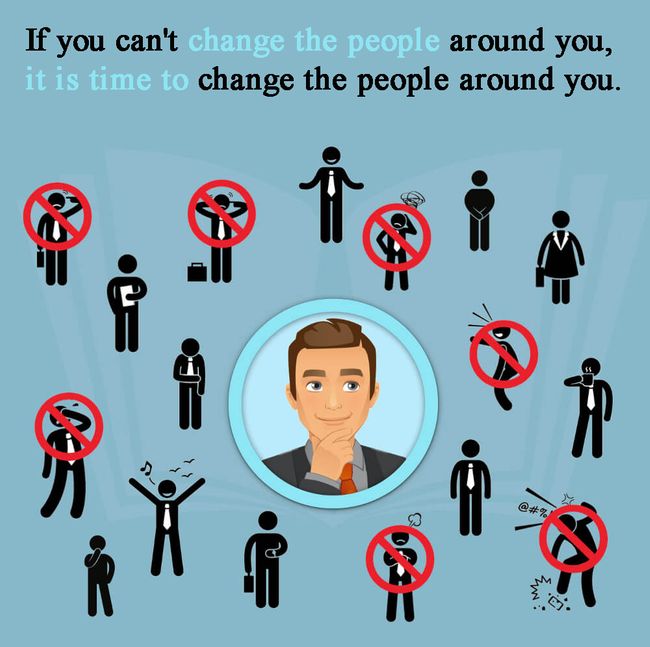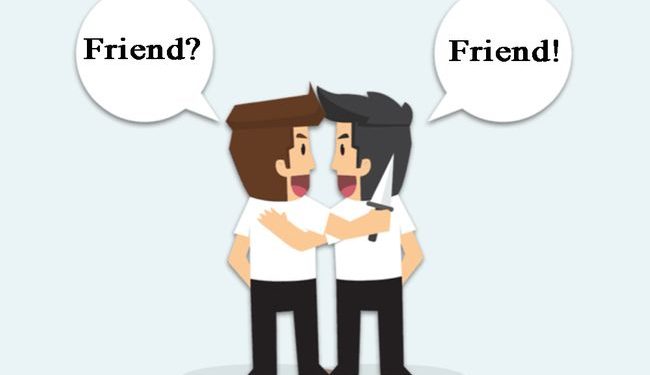Fake friends are as useful as a chocolate hot water bottle. Stupid when we rely on someone who leaves us as soon as it matters. Nevertheless, we keep falling for people who play the wrong game with us. Why?
In fact, that doesn’t always have something to do with naivety or poor knowledge of human nature. We’ll show you how to recognize false friends and – more importantly: how to get rid of false friends …
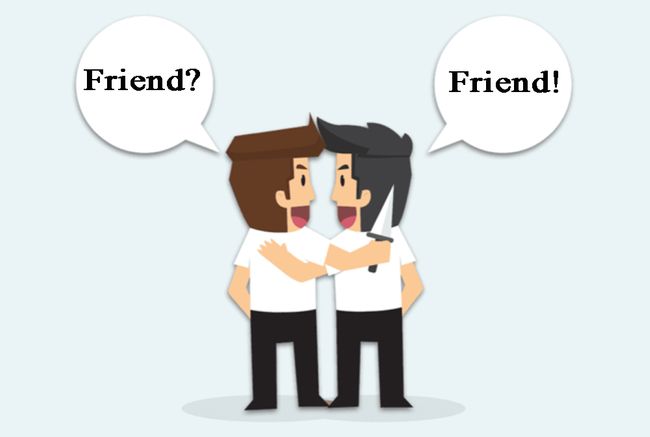
What are fake friends?
False friends are a contradiction in terms: Friends are good for us, enrich our lives, and support us. Good friends help us through difficult times and rebuild us in life crises. They bring out the best in us, encourage us to try new paths, and are at our side with lots of tips. Ideally, they are a mix of a career counselor, entertainer, constructive critic, and heartache aunt. Not always everything at the same time, but what we need right now. Most importantly, they are not: envious or disloyal. You can rely on good friends. Always.
False friends, on the other hand, are just pretending to do all of this. In fact, they take advantage of us, manipulate us and harm us – often for a long time and unnoticed. We believe in their loyalty and friendship – until proven otherwise or until they are exposed (in an emergency). However, that feels worse than facing an enemy. It works like a stab in the back. A disappointment in the literal sense of the word. “How could I be so stupid? Why was I so blind? ”Many people ask. Good question…
Good friends, wrong friends: the differences
Typical characteristics and identifying features of good and false friends. What Click through the picture gallery!
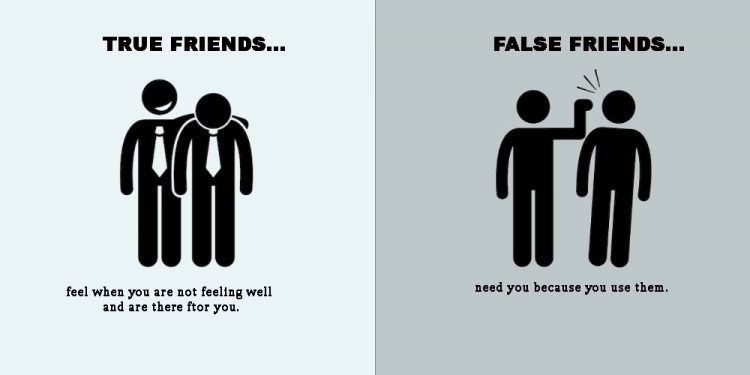
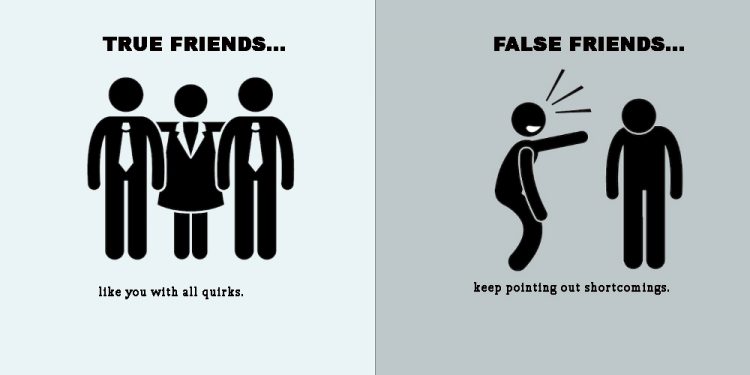
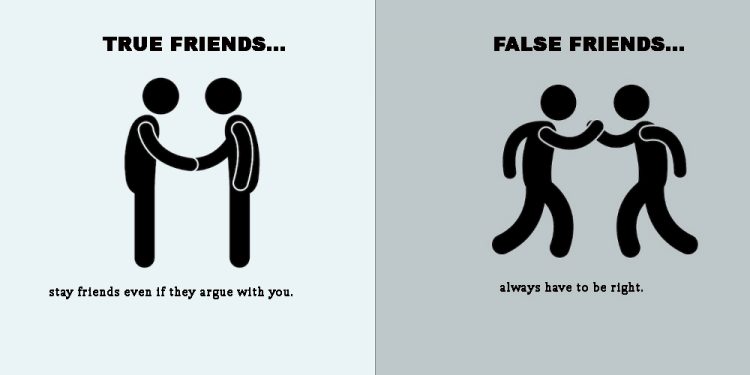
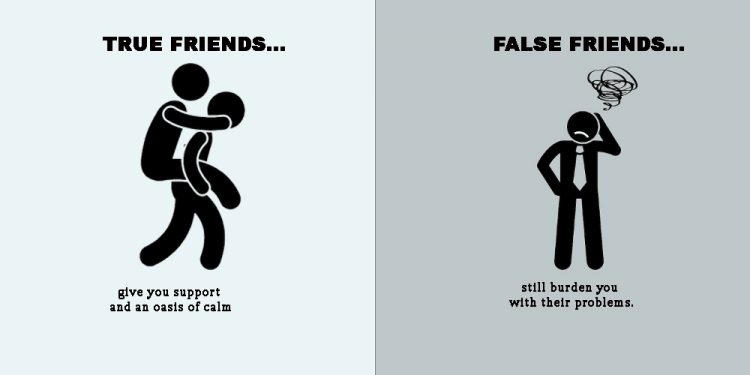
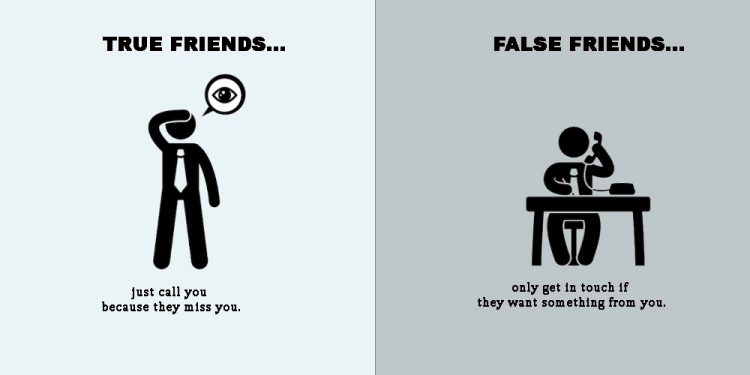
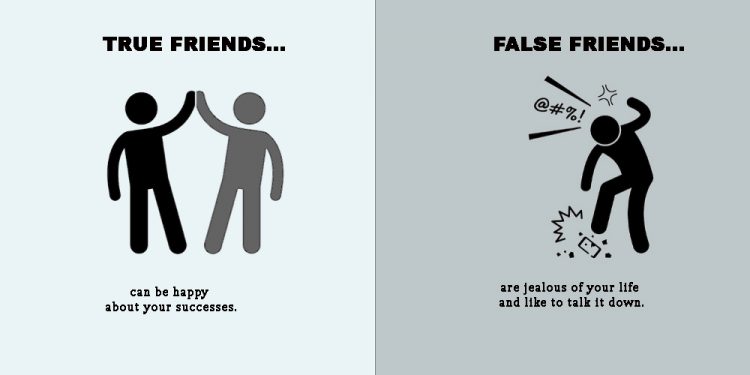
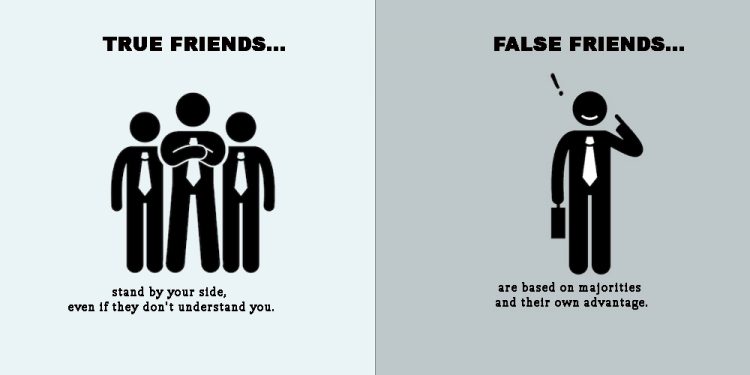
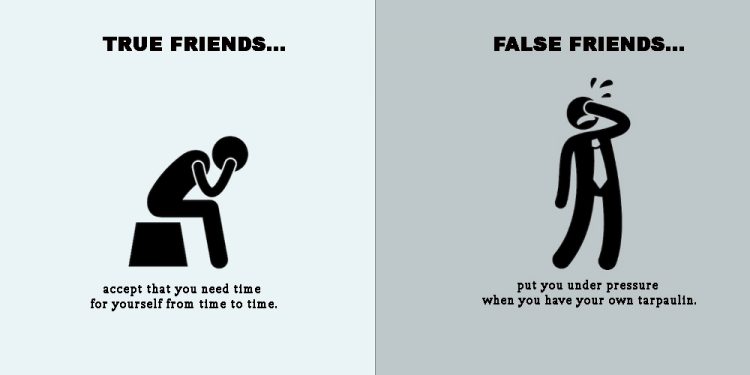
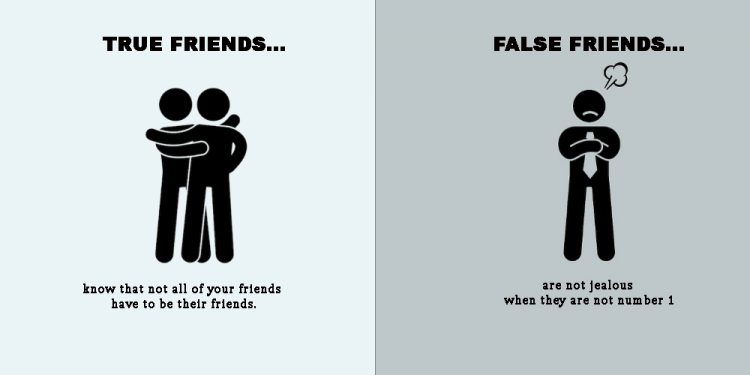
Quotes about fake friends to think about
- “True friends see your mistakes and point them out to you. False friends draw the attention of others to them. “
- “False friends believe rumors. True friends believe in you. “
- “Sometimes your enemy is more honest than your friend. Because he stands with the knife in front of you and not behind you. “
- “You can recognize false friends by the fact that they vanish into thin air when it matters.”
- “Breaking up with false friends is also a form of waste separation.”
- “False friends believe rumors. Real friends believe in you. “
- “There are no false friends. Just fake people who pretend to be your friends. “
Why do we fall for the wrong people?
Of course, it is easy to hold harmed people up to naivete or poor knowledge of human nature. Before you doubt your judgment: The great (perhaps the only) strength of false friends is to manipulate others and to take advantage of their trust. They are masters at disguising their selfishness and narcissism and hiding their selfish affection behind a spell of cheap words and strategic gestures. Your sparse words taste good at first but seem like creeping poison.
It is not naivety that makes us fall for them, but rather our goodwill. Affected people want to believe in what is good in people. Necessarily. Even if there are already the first warning signs or doubts. Motto: “He/she can’t possibly have done or said that!” Those affected are determined people-friends with a high degree of openness and the willingness to give their counterpart a lot of emotional credit, sympathy, and advance praise. Until the day of bad adulthood.
How do I recognize fake friends?
Life experience is the best protection against false friends. The good news is that as we get older, we recognize fake people better and better. Likewise in crises. But even before that, there are veritable signs by which false friends can be recognized:
- False friends are envious.
- They are happy for us, at best.
- False friends are noticeably unreliable.
- They prefer to talk about themselves and hardly listen.
- False friends are generally full of jealousy.
- They are often harsh in tone.
- Wrong friends make you feel bad.
- They rarely apologize.
- False friends talk about us behind our backs.
- They judge us for our mistakes.
- False friends are moody use us as lightning rods.
- You are extremely resentful.
- False friends are seldom considerate.
- You are better at talking than at giving.
- False friends lie a lot and are full of contradictions.
- You make your friendship conditional.
Very often false friends act like camouflaged rivals: They want things to go well for us – but please never better than for them. You support us. But only as long as we just don’t outgrow their shadow. In that case, they immediately begin to distance themselves from us or even sabotage our success.
You should be aware of all these signals and not ignore them. Of course, all of this can happen in a healthy friendship as well. Best friends aren’t perfect either. But accumulated and chronic these are serious warning signs of a wrong friend, nasty character, an emotional parasite. In this case, you should take appropriate action. Already for self-protection.
Toxic types: beware of these people
The wolf in sheep’s clothing disguises itself well. Every now and then, however, the wrong guys drop their masks or expose themselves. The following guys are toxic. Whenever you recognize this, you should keep your distance (for the sake of uniformity, all types are written in male form – they are of course also among women and girlfriends):
The hypocrite
It is part of the standard inventory of false friends: it lies to you, tells you what you want to hear, but never tells you the truth. In the worst case, he’ll blaspheme you behind your back. He pretends to be all right with you. He tells others that he told you straight away how hopeless your idea was.
The opportunist
If he’s feeling bad, he’ll call her at three in the morning too. But woe betide you are on fire. Then suddenly he has no more time. Typical fair-weather friend. Or his behavior depends on the environment. In certain circles, you are both “best friends forever”. Outside of this group, however, he hardly knows them. The behavior is also the other way around: you laugh at the same things together. As soon as you move among people who are higher in the hierarchy, for example, he will drop you like a hot potato if that benefits him.
The critic
No matter what you do, it’s not good enough. This toxic guy knows everything better – and everything under the guise of just trying to help you. However, his criticism is never solution-oriented. As he takes them apart, they get worse and worse. He subtly conveys to them that they are a loser who needs this friend. Without him, they would be nothing. Lost.
The rival
He needs what you have. Always. Ideally, however, bigger, better, faster. You buy a new smartphone – it is 600 euros more expensive and can do more. This is how it works in all areas, including at work. That can lead to pushing each other. But in the long run, this type is exhausting. He always has to be the focus and gives you the feeling of being inferior.
The parasite
He feels good as long as you feel bad. He needs her suffering to make himself feel better or superior. As soon as you step out of its shadow, it pulls you back down. Because every other success gnaws at his self-esteem. It is fed by extreme competitive thinking: You can only win when others lose. Deadly poisonous!
The converter
False friends like this one are trying to change you all the time. The way you are, you are not okay. Too fat, too thin, too boring, too unfashionable, too stupid, too unsportsmanlike, too uncool … This is not only highly manipulative but also the exact opposite of the definition for a friend: He loves you because you are, who and how They are – and are not ashamed of you either.
Wrong friends at work
“Wrong friends” in the job are a special case. These are less toxic colleagues who play along with you, but rather wrong supporters at the wrong time. Motto: Well meant is the little brother of crap.
An example: You are sitting in a meeting and discussing an excessive workload with the boss. The colleague who is known to everyone as a hundred-year-old and a chronic slacker jumps to your side. Of course, he also thinks that he has to do too much for his money. Speaking of which: When will the next raise be? Gone stupid. There was no better way to bury the subject.
Sometimes things develop faster than germs in a petri dish. Opinions are exchanged, debates become heated and alliances are formed almost automatically. However, even the best positions and arguments can dramatically lose their strength if they are supported by those who lead them to absurdity through their way of life or through their choice of words. These false friends mean well but still mutate into leg saws and royal killers.
You can hardly protect and save from this. At most, you can distance yourself from it and clearly keep your distance from the wrong supporter without changing your stance. This may not save the overturned debate – or at least your own reputation. Otherwise, it is better to find one or two good supporters and arguments as a foundation beforehand. Even false friends don’t tear that down so quickly.
How do you deal with fake friends?
First of all: listen to your gut instinct. There is very likely a reason you Googled this topic on the internet or found this article on Career Bible and clicked it. If you have recognized one or more false friends in your environment, you should act. We recommend four steps for dealing with toxic people:
- Address the behavior. First, seek a one-to-one conversation. Talk to the “friend” about his behavior and show how you feel about it through “I messages”. Give examples of such situations and explain what you would have expected. Some are not even aware of their wrongdoing. In this way, you can try to save the friendship and find a solution at the first attempt.
- Point out the consequences. Sometimes only clear announcements help. Make it clear to your still-boyfriend what you understand by friendship and what you expect from a true friend – for example, reliability, loyalty, empathy. At the same time, show credible consequences if the behavior does not change.
- Watch the development. Sharpen your sensorium and take a look at the development of your relationship after a few days or weeks: Has the boyfriend or girlfriend taken the warning shot to heart, does their behavior change and respond more to you again? Is he or she investing in the relationship? Then she is worth something to him or her. Otherwise, it never was.
- Draw consequences. Even if the realization is painful: recognizing false friends early on will save you from a lot of grief and disappointment in the future. Only one courageous step and line can help here: End the friendship (which never was) and avoid future contact as best you can. Polite but aloof.
